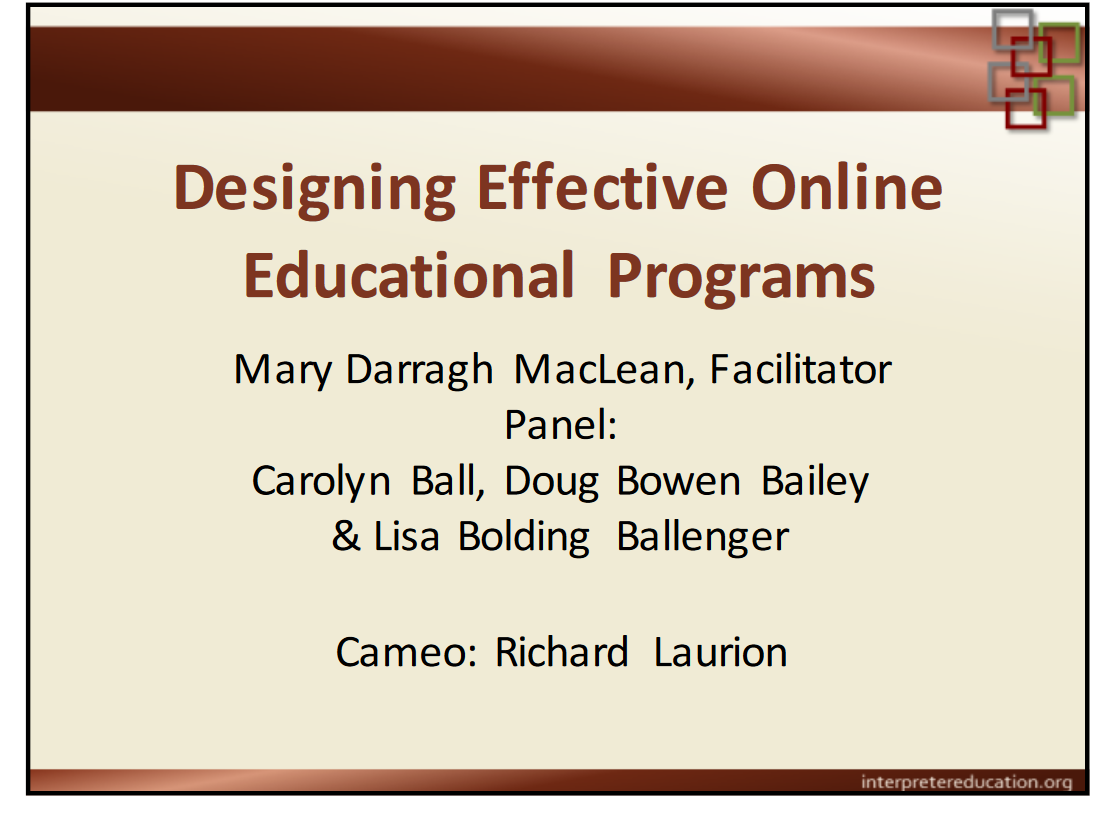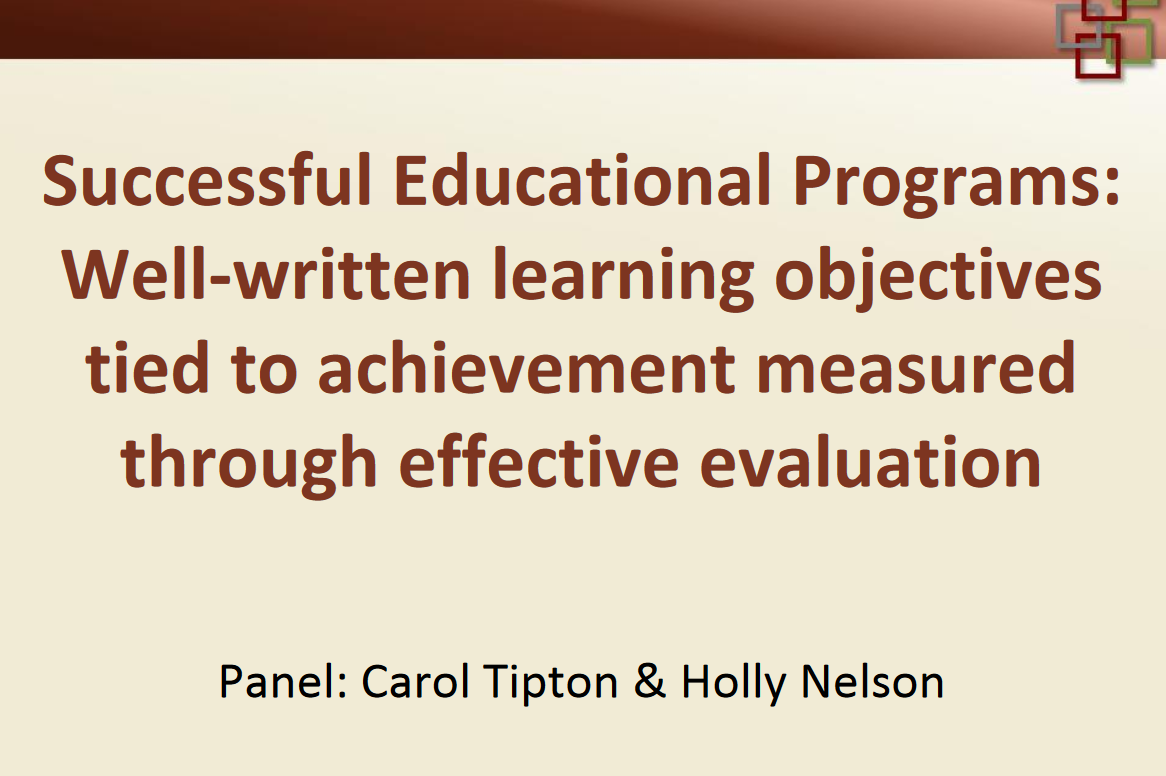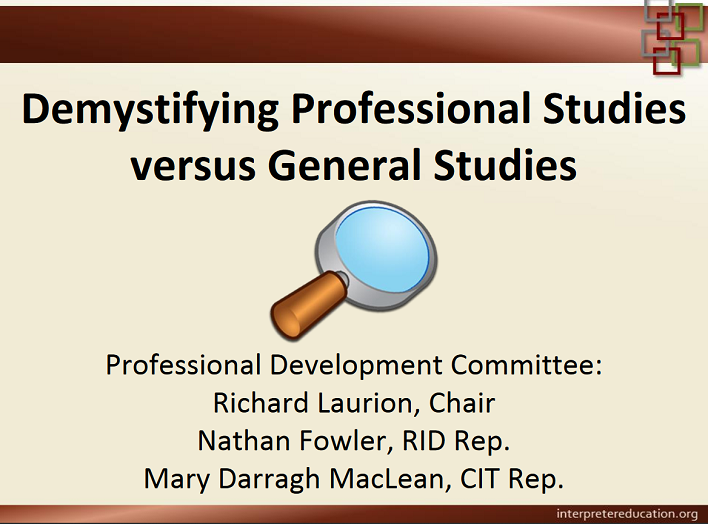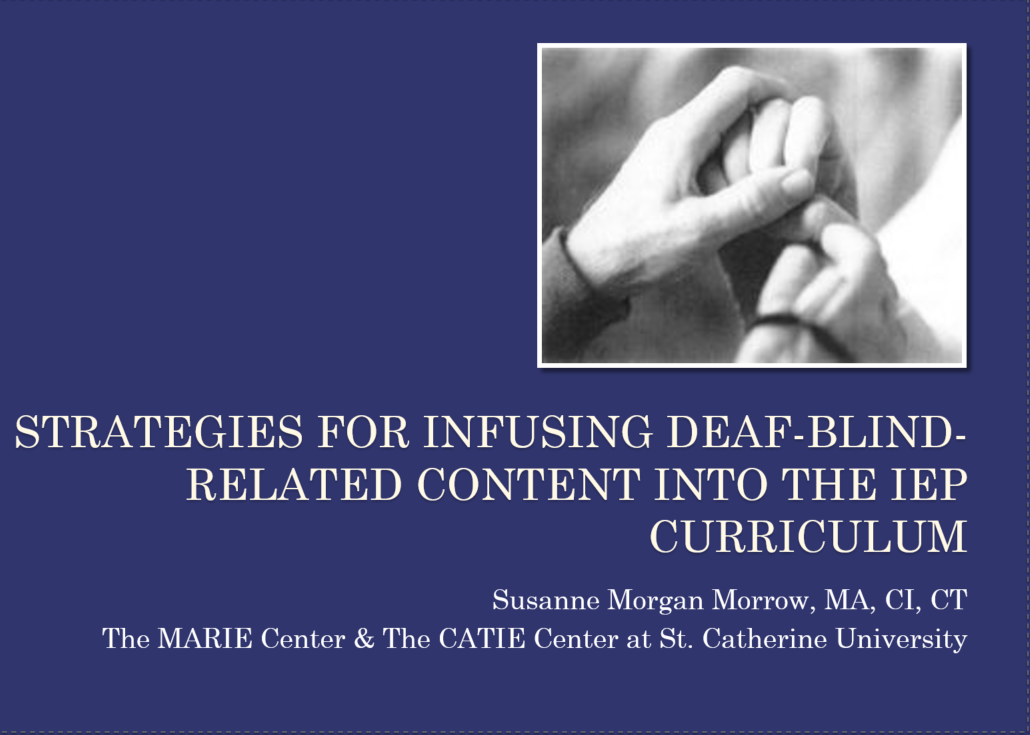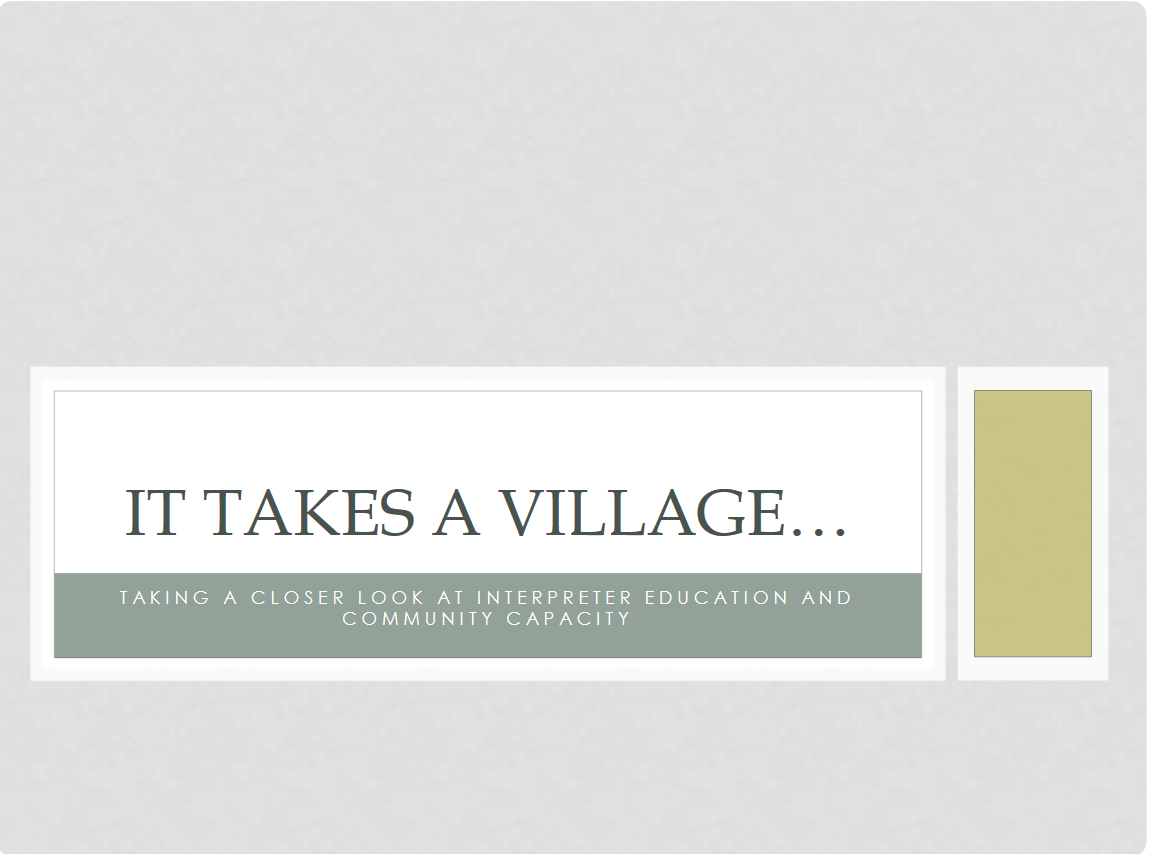Webinars:
Education of Interpreters Series
This collection of webinar focuses on a variety of topic areas related to pre-service and in-service education of interpreters.
The following is provided for each webinar:
-
- Title,
- Air date,
- Presenter,
- Description,
- Target audience, and
- Aavailable materials are provided.
Within this series, webinars are listed in chronological order from the most recent webinar to the oldest.
Want CEUs?
- Find a CMP Approved Sponsor for an Independent Study through the Registry of Interpreters for the Deaf
- Work with the Sponsor to design an Independent Study plan involving any of the webinars below
Education of Interpreters Webinars
Designing Effective Online Educational Programs
Original Air Date: June 13, 2016
Facilitator: Mary Darragh MacLean
Panelists: Doug Bowen Bailey, Carolyn Ball, & Lisa Bolding
Description: When the RID Certification Maintenance Program was first launched in 1985 the only distance learning was attending conferences or conventions. Today more than nearly ½ of all RID approved training takes place online. However, how do we know this is effective education or not.
This webinar will focus on the current state of online education as supported through RID Approved Sponsors. Participants will have the benefit to listen to a panel experienced in produce successful online educational programming for interpreters.
Target Audience: Program administrators for approved RID sponsors, interpreter educators, workshop presenters & interested stakeholders
Materials:
Successful Educational Programs: Well-Written Learning Objectives Tied to Achievement Measured Through Effective Evaluation
Original Air Date: May 23, 2016
Facilitator: Richard Laurion
Panelists: Carol Tipton and Holly Nelson
Description: One of the most challenging tasks for workshop presenters, instructors of continuing education and credit classes and CMP administrators is ascertaining that learning objectives are valid and robust. Then taking a critical or evaluative look at whether the programming provided achieved the desired learning objectives.
During this webinar we will first explore what learning objectives are, what they must include and how to create them. We will also distinguish learning objectives from instructor objectives, a common source of confusion for presenters and administrators.
The second portion of our program will consider how we measure our success. How do we build evaluation tools that link with the learning objectives and help us identify what was successful or what might need to be tweaked in the future. Examining both ends of an educational programming will allow us to better determine if there was a successful transfer of knowledge to participants.
Target Audience: Program administrators for approved RID sponsors, interpreter educators, workshop presenters & interested stakeholders
Materials:
Demystifying Professional Studies verses General Studies
Original Air Date: April 25, 2016
Presenters: Richard Laurion, Nathan Fowler, & Mary Darragh MacLean (PDC Team Members)
Description: The RID Certification Maintenance (CMP) and Associate Continuing Education Tracking (ACET) Programs were developed with flexibility in mind.
When these programs were developed, it was recognized that RID was a young organization and the field and science of interpreting was still developing. The authors for the CMP/ACET programs wanted to include a way for interpreters to demonstrate their currency in the field (as part of any credential maintenance program) and that might still allow for new and innovative information to be brought into the field.
Creating a General Studies area allowed RID members to explore information that did not have an immediate relevance to interpreting. It also provided a mechanism for interpreters to explore studies of topics they may seek to interpret in the future, thereby building a solid base of background and understanding for the topic. This webinar will explore the distinctions between RID’s Professional Studies category and that of General Studies. We will seek to help participants know how to better advise certified interpreters in documenting their educational endeavors and in making connections between what is or is not a Professional Studies pursuit.
Target Audience: Program administrators for approved RID sponsors, interpreter educators, workshop presenters & interested stakeholders
Materials:
Strategies for Infusing Deaf-Blind Related Content into the IEP Curriculum
Original Air Date: November 15, 2012
Presenter: Susanne Morgan Morrow, MA, CI, CT
Description: It is the intention of Interpreter Education Programs to prepare well-rounded, knowledgeable and skilled practitioners. Yet we are doing them a disservice by not providing adequate exposure and experiences specific to deaf-blind interpreting strategies.
A recent survey conducted by the National Task Force on Deaf-Blind Interpreting & the National Consortium of Interpreter Education Centers validated this concern as many instructors reported a lack of the requisite content knowledge and skills that are needed to teach deaf-blind content. This online webinar will provide a platform for the sharing of resources amongst IEP instructors on content, activities and materials that are available. Content will be shared from the national survey of interpreter educators, examples of content that should be incorporated and activities for inclusion into the IEP will be suggested. IEP instructors will be asked to share their own ideas and suggestions to their colleagues.
Target Audience: Interpreter Education Program faculty, internship hosts/supervisors, mentors, working interpreters & IEP students
Materials:
It Takes a Village...Taking a Closer Look at Interpreter Education and Community Capacity
Original Air Date: August 23, 2012
Presenter: Paula Gajewski Mickelson
Description: Interpreting is a profession born of the community. As interpreter education programs have moved to academia and the academic bar continues to raise, the challenge facing programs and faculty is in finding “the zone” – that sweet spot that balances academia and the real-life learning that can only happen through community involvement.
Interpreting students will often take the knowledge they learn into the community via observations, volunteer work, service learning, internships and other activities. Members of the Deaf Community are a vital, necessary part of this mix. Programs must have internship sites that have experienced strong interpreter supervisors to oversee student work. Community involvement and resources are necessary for program and student success. At the same time, more and more community members and internship sites are saying “thanks, but no thanks.” “We’d love to help, but we can’t this time.” “We are already working with students from other programs, we can’t do more.” “How does this (hosting an intern/volunteering for the program) benefit me?” This webinar will begin to explore the idea of community capacity with program directors from interpreter education programs across the country.
Target Audience: IEP students, IEP faculty, internship hosts/supervisors, mentors & working interpreters
Materials:
Grant Recognition
The contents of the Project CLIMB website was developed under a grant (#H160D160001) from the Department of Education. The contents do not necessarily represent the policy of the Department of Education. Do not assume endorsement by the Federal government.
As of December 31, 2021, this grant project is no longer active or soliciting applications.
This website will remain available as a resource.

The National Clearinghouse of Rehabilitation Training Materials (NCRTM) website is a central portal for accessing archived and new rehabilitation training resources offering search capabilities, a quality rating system, as well as enhanced usability and accessibility.

